Thursday, October 8th 2020

CORSAIR Launches MP400, a New M.2 NVMe SSD with High-Density 3D QLC NAND
CORSAIR, a world leader in high-performance gaming peripherals and enthusiast components, today announced the launch of the new CORSAIR MP400 Gen3 PCIe x4 NVMe M.2 Solid State Drive, taking advantage of 3D QLC NAND technology to store massive amounts of data with lightning-fast transfer speeds of up to 3,400 MB/sec sequential read and 3,000 MB/sec sequential write. The MP400 is available now in 1 TB, 2 TB, or 4 TB capacities, with an 8 TB model coming soon.
Conveniently slotting directly into a motherboard thanks to its M.2 2280 industry-standard NVMe form-factor, the MP400 boasts wide-ranging compatibility and high-bandwidth performance, while its high-density 3D QLC NAND memory ensures better value than previous generation TLC NAND, able to store more data in the same amount of physical space.Like all CORSAIR solid state drives, the MP400 combines with free CORSAIR SSD Toolbox software, enabling convenient features such as secure erase and firmware updates right from the desktop. With endurance up to 1,600 TB Written and a five-year warranty for guaranteed peace of mind, the CORSAIR MP400 makes incredible M.2 performance and massive capacities available to more PC builds than ever before.
The CORSAIR MP400 M.2 NVMe SSD is available immediately from the CORSAIR webstore and the CORSAIR worldwide network of authorized retailers and distributors.
The MP400 is backed by a five-year warranty, alongside the CORSAIR worldwide customer service and technical support network.
Conveniently slotting directly into a motherboard thanks to its M.2 2280 industry-standard NVMe form-factor, the MP400 boasts wide-ranging compatibility and high-bandwidth performance, while its high-density 3D QLC NAND memory ensures better value than previous generation TLC NAND, able to store more data in the same amount of physical space.Like all CORSAIR solid state drives, the MP400 combines with free CORSAIR SSD Toolbox software, enabling convenient features such as secure erase and firmware updates right from the desktop. With endurance up to 1,600 TB Written and a five-year warranty for guaranteed peace of mind, the CORSAIR MP400 makes incredible M.2 performance and massive capacities available to more PC builds than ever before.
The CORSAIR MP400 M.2 NVMe SSD is available immediately from the CORSAIR webstore and the CORSAIR worldwide network of authorized retailers and distributors.
The MP400 is backed by a five-year warranty, alongside the CORSAIR worldwide customer service and technical support network.
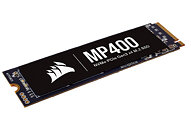
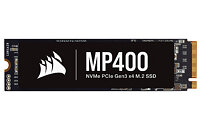
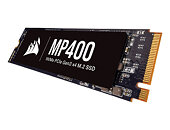
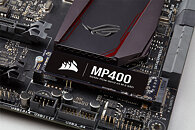
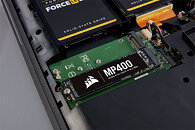
11 Comments on CORSAIR Launches MP400, a New M.2 NVMe SSD with High-Density 3D QLC NAND
3400/3000MB/s... moar bigger snooze....
But at least they have the 4TB & soon to be 8TB sizes, so there's that. Now if they can do that in some new Gen 4 drives, I will be all over them :)
If Gen3 is cheaper, then its a better match for QLC.
These are storage drives more so than OS drives, not that they don't work really well for OS drives too.
The 2 and 4 TB versions looks very interesting for my use case but time will tell if the QLC NAND is any good, the 8 TB is probably going to cost an arm and a leg
The Samsung 870 QVO was not very good and still used SATA so that was an option i dropped
The Intel 660P would in some use cases be super slow so that was not a very good option either but the MP400 might be better
That was the case with TLC/MLC too, but obviously to lesser degrees (i.e., not slower than HDD).
Right now i am using a HDD for that but i want to switch to an NVME drive just so it can be a little faster and so that the HDD´s can make a little bit less noise
QLC is only suited for massive SATA SSD that are supposed to replace HDD as storage drives.
www.tomshardware.com/reviews/corsair-force-mp400-ssd-review
NVMe drives get an added tax on it, so I suspect the 8TB model will be comically expensive like the Sabrant Rocket version.
The affordability of high capcity SSD's has stagnated for a long time now, capacities aren't increasing at a quick enough rate and the prices aren't coming down to reasonable levels anytime soon.
Anyone with a bit of common sense will continue to stick by the small SSD + big HDD rule, and it'll likely stay that way for the next decade.